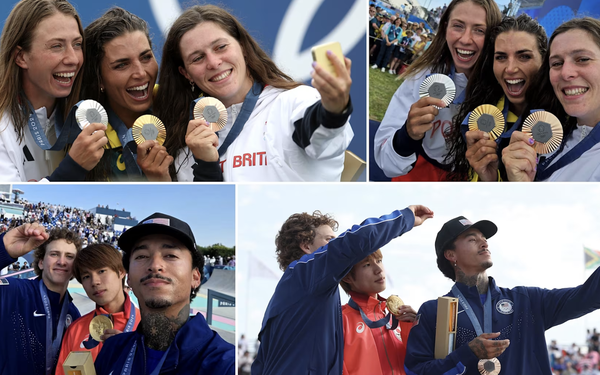
To say that
Sam Lewis, the U.S. president of WPP-backed T&Pm, is an Olympic superfan is a 100-meter understatement. A sports devotee since childhood, he also worked on the McCann-Erickson team that won the
account for the London Olympics in 2012, and got to be a torchbearer. Still basking in the glow of the Paris-to-Los Angeles hand-off, he tells Marketing Daily what brands should consider
before they suit up for Los Angeles in 2028.
Marketing Daily: You were a torchbearer! What a thrill. How did that happen?
Sam Lewis: I'm a sports nut and have always been
a big fan of the Olympic and Paralympic Games. And I’ve been involved with Olympic marketing campaigns since Beijing in 2008. We pitched and won the contract to be marketing services provider
for the London Games, and that meant two of us from the agency got to run with the Olympic torch three days before the opening ceremony. It was an amazing experience.
advertisement
advertisement
Marketing Daily:
Switching to Paris: Overall, what did you think? Which brands got it right, and which got it wrong?
Lewis: It is hard to make global advertising for a major sports function.
You’re constricted, typically by many internal stakeholders and tight IOC guidelines. You see brands fall into the same traps. Everyone is trying to talk about personal bests or elite
performance, but not many brands connect there. I think LVMH did well this year, and Samsung just smashed it with the selfies.
Marketing Daily: Many advertisers are furious at LVMH. IOC
guidelines are that stadia are supposed to be free from advertising, and plenty think LVMH pushed the envelope too far -- the branded trunks carrying the medals, for example.
Lewis: But
you see two sides to that, right? Some people did complain. But it was so elegantly done!
Marketing Daily: And what about Samsung?
Lewis: This was the first
time phones were allowed on the field of play. I’ve always thought that was a shame because the athletes couldn’t capture the best image ever, which is them standing up on the podium.
Samsung showing up there is such an authentic use case. And the way they’ve been stitching the photos together with their new AI technology is super-smart and neatly done.

Marketing Daily: Other winners?
Lewis: We’ve seen automotive manufacturers use those little self-driving cars in increasingly fun and innovative ways, like bringing out the discus and the shot put. And those Phryges,
those weird, anthropomorphized hats that were the game mascots – by the end, everyone was saluting those hats as being fun.
Marketing Daily: Is it fair to say this was the first
truly social media Olympics? Many people who didn’t even watch the games got to meet athletes and see snippets on TikTok. Ilona Maher, the American rugby player, got 4 million followers almost
overnight. “Pommel Horse Guy” and the Turkish shooter have been making meme magic.
Lewis: Well, Tokyo was [a social media event,] but it was so heavily affected by
COVID.
But let’s compromise and say it was the most sophisticated social media Olympics yet. What struck me was the power of the single image and how enduring it can be.
Gymnasts
Simone Biles and Jordan Chiles bowing down to Brazil’s Rebecca Andrade. The break dancer who was disqualified after she performed in a cape that said, “Free Afghan women.” The
amazing shot of the Brazilian surfer kicking out of his wave and holding his hand up. There were some downsides, too, that come with social media. I was disappointed with [the negative criticism of]
Raygun, the Australian break dancer.
Marketing Daily: How do you think brand Paris fared?
Lewis: It was a brilliant celebration. The backdrop of Paris, shot so
cinematically. I love the way they used the city so smartly. It seemed like every shot was deliberately framed to have some iconic landmark in the background or the foreground. I would give Paris a
gold medal! And remember, we’re only halfway through. The Paralympic Games are incredibly powerful and even more fun. Fewer celebrities, but more locals.
Marketing Daily: And how
about the Olympics brand itself?
Lewis: They’ve done well! And the baton pass to LA – not always smooth – was also well done. The U.S. certainly knows how to put on a
show with a little star factor. I was in LA over the weekend, and the local activity was fantastic, whetting the appetite for ’28. I also think the games left plenty of room for the magic of the
unscripted.
Take Snoop. Coming into the games, some people were probably scratching their heads. But it was a master stroke.
Marketing Daily: One of the goals of adding break
dancing and skateboarding has been to attract younger viewers. Do you think that’s working?
Lewis: The demographics were increasingly targeted towards younger people, revolving
around social and more viral moments. And we saw lots of that kind of quirkier humor, and that’s only going to accelerate. Marketers need to plan for that.
Brands need to go into the
games with a plan but also a reactive plan. Some of the best moments and the most traction comes from taking advantage of those viral moments.